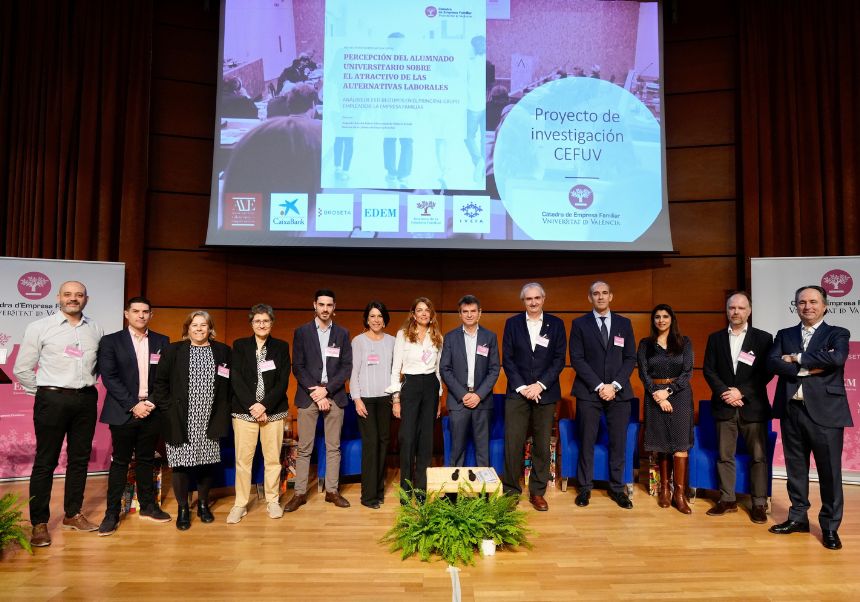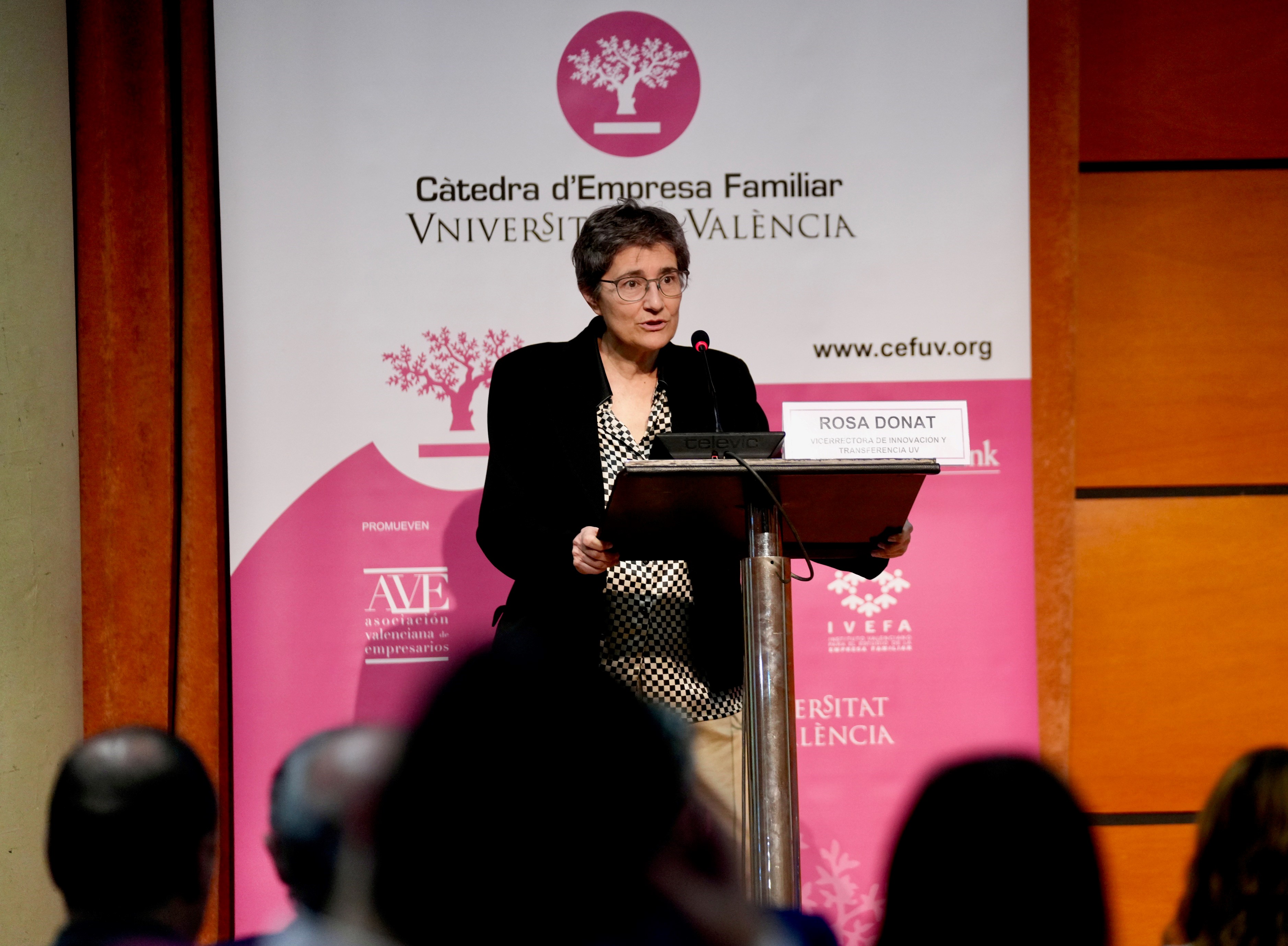
Valencia 1 December 2023. The Chair of Family Business of the University of Valencia (CEFUV) promoted by the Valencian Association of Entrepreneurs (AVE), the School of Entrepreneurs (EDEM), the Valencian Institute for the Study of Family Business (IVEFA), the Institute of Family Business (IEF) and the University of Valencia (UV), and sponsored by CaixaBank and Broseta, organised a conference to present and discuss the report prepared by the Chair's research team on the perceptions of university students of the different employment alternatives and, in particular, on the characteristics and working conditions they associate with Family Businesses.
The conference was opened by the Vice-Rector for Innovation and Transfer of the University of Valencia, Rosa Donat.
Alejandro Escribá, professor at the University of Valencia and director of the CEFUV, then presented the study entitled "Perceptions of university students on employment alternatives: analysis of stereotypes in the first employer group (family business)". The study was carried out in collaboration with the University of Valencia, the Polytechnic University of Valencia, EDEM, the CEU-Cardenal Herrera University, the European University of Valencia and the Faculty of Economics of the Catholic University of Valencia.
Professor Escribá presented the data obtained from more than 1,600 responses from university students from public and private universities in Valencia. In his presentation, he emphasised that in general terms, students' knowledge of the reality of the labour market is limited. However, among their preferences, non-family-owned, large companies with a certain technological nature, as well as start-ups and new knowledge-based companies stand out. Family businesses, prevalent in the Spanish economy and responsible for generating 66% of private employment, are relegated to fourth place, although ahead of public administration. The image of family businesses is somewhat more positive among students at private universities and also among female students.
The data indicate that there is insufficient awareness of their relevance in the economy and of the enormous heterogeneity among family businesses. In this sense, the students' perception is very positive in some aspects, and very far from the ideal in others. On the positive side, they highlight their commitment to the territory and local society, their closeness and humane treatment of employees, the stability and working environment they offer, and the possibilities they offer for work-life balance. However, they perceive themselves to be far from the ideal in aspects related to salaries, the possibilities of learning and obtaining training or enjoying career plans. These last aspects are very relevant for the young participants, and show the path that should be taken by family businesses and universities to break the strong stereotypes that exist around family businesses and that limit their capacity to attract talent.
Two round tables were held to analyse these results. The first of these was made up of heads of employment and career guidance services from public and private universities: Jesús Soret (delegate of the Rector for employment and internships at the UV); Sergio Esteve (director of professional careers and alumni at EDEM); Elena Caballero (head of the Employment Observatory Service of the SIE at the UPV); and Sonia Cabañas (head of professional careers at the CEU-Cardenal Herrera University). These experts have reflected on the improvements that can be introduced in the university environment to increase the degree of knowledge that students have of the reality of employment and bring their skills closer to the needs of companies. They also presented their ideas on the role that the company should play in these processes, from the development of training practices, to the involvement in the teaching and curricular activities of students.
In terms of self-criticism, possible improvements in career guidance programmes were put forward, taking advantage of the student profiles identified in the study and bringing business reality closer to the classroom. By way of example, Sergio Esteve stated that "universities have to be the point of union between students and companies. At EDEM, we believe that students should touch the business reality from day one in order to learn how the knowledge they acquire is applied in the world of work". For her part, Elena Caballero made a call to the business world indicating that "the family business and the university share the mission and vision of cultivating knowledge, where talent and educational innovation are intertwined to build a solid and promising future. Our young people expect us to work together to enhance and retain talent in our community. I invite you to tell us what you, as a family business, need from us". Sonia Cabañas wanted to highlight that "studies like this are needed to make us aware of things that perhaps we are not calibrating properly" and Jesús Soret stated that "the first challenge we have before us is to get companies to offer paid internships. At present, 60% of internships are not paid".
This was followed by another interesting discussion with managers and experts in the field of family businesses. The round table, moderated by Alejandro Ríos (Managing Partner of Broseta Abogados) was attended by Bernardo Gregori (President of the Family Council of Grefusa); Rafael Pérez (Director of Human Resources of the Simetría Group) and Esteban Sastre (Director of Economics and Business of the Instituto de Empresa Familiar - IEF). This round table debated the existing stereotypes surrounding family businesses and the practices and policies that serve to correct the often biased view of the reality of these companies. Rafael Pérez (Grupo Simetría) pointed out that "family businesses play an essential role in the Spanish economy and allow professionals to develop essential qualities such as global vision, adaptability and a sense of belonging to the company". In his opinion, "the perception of family businesses does not do justice to the high level of professionalism that can be observed in many of them". Along the same lines, Bernardo Gregori (Grefusa) encouraged family businesses to work to "eliminate prejudices; family businesses should boast and show off the pride of being a family business in any forum".
Alejandro Ríos (Broseta) stressed that the study presented at this event "allows us to conclude that, despite the efforts to disseminate and the possibilities for professional development offered by family businesses, there are still false prejudices on the part of students about family businesses, which is why we must continue to work on this". Similarly, Esteban Sastre (IEF) pointed out that "at a time of very significant and permanent changes, family businesses must learn to adapt to new circumstances in order to attract and retain talent. This type of report allows us to better understand the opinion of young university students, which can be of great help in decision-making".
In conclusion, Escribá stressed that "there has been awareness of the existence of stereotypes for a long time, but the pioneering measurement carried out in this work is crucial to be able to guide action plans to bring the business world closer to the university world, as well as to evaluate the effectiveness of these efforts".
Images:










